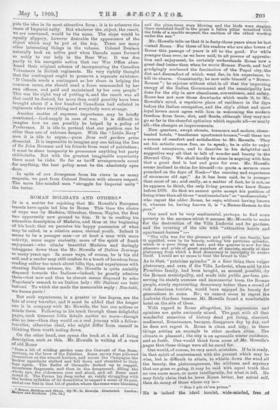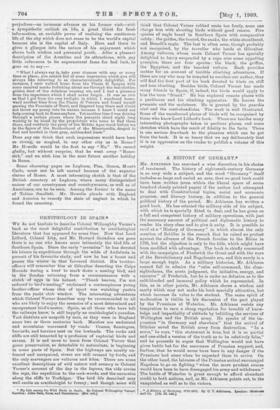ROMAN HOLIDAYS AND OTHERS.* Ix is a matter for rejoicing
that Mr. Howells's European travels have again led him to Rome. This time the choice of ways was by Madeira, Gibraltar, Genoa, Naples, the first two apparently new ground to him. It is in reading his attractive description of Madeira, and thus at the beginning of his book, that we perceive his • happy possession of what may be called, in a relative sense, eternal youth. Indeed it seems to be a younger man—or at least a man with more activity, more eager curiosity, more of the spirit of frank -enjoyment—who climbs beautiful Madeira and daringly toboggans down than the Mr. Howells of Dalian Journeys so many years ago. In some ways, of course, he is his old self, and a reader may still confess to a touch of boredom from reading rather too much about bills, tips, and experiences with cheating Italian cabmen, 8te. Mr. Howells is quite amiably disposed towards the Italians—indeed, he greatly admires them—but now and then he almost seems disposed to echo Napoleon's remark to an Italian lady : Gli Daliani son tufa ladroni. To which she made the memorable reply .Nan tutti, ma.buona parts!
But such experiences, in a greater or less degree, are the fate of every traveller, and it must be added that the longer one is in company with Mr. Howells, the less one notices or minds them. Following in his track through these delightful Pages, such tiresome little details matter no more—though also no less—than they would on .a real journey with a fellow- traveller, otherwise ideal, who might differ from oneself in thinking them worth noting down.
On the other band, one opens the book at a bit of living description such as this. Mr. Howells is writing of a .view of old Rome "from a bit of wilding garden near the Convent of San Bona- Ventura, on the brow of the Palatine. Some snowy tope pillowed themselves on the utmost horizon, and across the Campagna the broken aqueducts stalked and fell down and stumbled to their logs again. The Baths of Caracalln, bulked up in rugged, monstrous fragments, and then in the foreground, filling the Whole eye, the Colosseum rose and stood, and all Rome sank round it. The Forum lay deep under us, vainly struggling with ' the broken syllables of its 'demolition to impart a sense of its past, and at our feet in that bit of garden where the roses were blooming Roman Het:clays and Others. V, D. owells. illustrated. London; Ahrpor and Brothers. [lOs. 6.1.] and the plum-trees were blowing and the birds were singing, there stretched itself in the grass a fallen pillar wreathed with the folds of a marble serpent, the emblem of the oldest worship under the sun."
Mr. Howells tells us that it is forty-three years since he last visited Rome. For those of his readers who are also lovers of Rome this passage of years is all to the good. For while younger than ever, as we have said, in all powers of apprecia- tion and enjoyment, he certainly understands Rome now a great deal better than when he wrote Roman Pearls,and half grudgingly confessed the fascination of the Papal city,.the dirt and discomfort of which . went far, in his experience, to kill its charm. Consistently, he now mills himself a " Newer- Roman ": he rejoices without stint, in all that the improving energy of the Italian Government and the municipality has done for the city in new cleanliness, ,convenience, and safety. Rome has not now those drawbacks which .made it, to Mr. Howells's mind, a repulsive place of residence in the days before the Italian occupation, and the city's oldest and. most loyal lovers must agree with him in welcoming the modern freedom from fever, dirt, and floods, although they marnot go so far in the cheerful optimism which regards all—or neatly all—the changes as improvements.
New quarters, swept, streets, tramcars and motors, steam- heated hotels, "handsome apartment-houses,"—all these are a source of comfort and. satisfaction to Mr. Howells. They set his artistic sense free, so to speak; he is 'able to enjoy without annoyance, and to describe in his delightful and suggestive way alL that is left of wonder and beauty in the Eternal City. We ,shall hardly be alone in arguing with him that a great deal is lost and gone for ever. Mr. Howells seems inclined to claim for himself—to quote a sermon once preached on the days of Noah—" the cunning and experience of enormous old age." As it has been said, he is younger than most of us; and really, as a matter of fact, he is not,, as be appears to think, the only living person who knew Rome before .1870. So that we cannot quite accept his position of 'being wiser than all those "sentimentalists" or "mediaevalists " who regret the older .Rome, be says, without having known it, whereas he, having known it, is "a Newer-Roman to the One need not be very sentimental, perhaps, to find some poverty in the excuses which it amuses Mr. Howell. to make for the destruction of the Villa Ludovisi and Its gardens, and the covering of the site with "attractive hotels and apartment-houses " " The villa was for the pleasure and pride of one family, hut it signified, even in its beauty, nothing but patrician eplendor, which is a poor thing at best ; and the quarter is now for the pleasure and pride of great numbers of tourists, mostly of that plutocracy from which a final democracy is inevitably to evolve itself. I could ilee no cause to beat the breast in this.'
As to that, "patrician pplendor" is ,a finer thing than vulgar plutocracy, and even if the Villa Ludovisi, when sold by the Piombino family, had been bought, as seemed ,possible, by the Roman municipality, and made into public gardens, pre- serving its stately avenues and immemorial tree, the Romen people, surely representing democracy better than a crowd a rich American tourists, would have enjoyed its beauty for generations to come. No; we cannot cease to regret the Ludovisi Gardens because Mr. Howells found a comfortable hotel on the site of them.
With regard to Rome altogether, his impressions and opinions are quite curiously mixed. The. past, with all that wonderful sensation of history dead yet living, classical, mediaeval, Renaissance, baroque, disappears day by day, and he does not regret it. Rome is clean and tidy; in these things setting an example to other modern cities. The climate is pleasant; the city is an agreeable winter residence, and so forth. One would think from some of ;Mr. Howells's pages that these things were all he cared for. One would, of course, be very much mistaken. If he is ready, in that spirit of contentment with the present which may be wise, but is difficult to attain, to whistle down the wind all the beauty, the picturesqueness, the .wildness and mystery that are gone or going, it may be said with equal truth that no one cares more, or more intelligently, for what is left. He may fairly claim that he loves .Rome bettor, her actual self, than do many of those whose cry is- " Non 6 pih ch'ers, prima."
He is indeed the ideal touriat, wide-minded, freo of
prejudices—an immense advance on his former visit—with a sympathetic outlook on' life, a great thirst for fresh information, an enviable power of realising the continuous life of the city which does not cease to be the world's capital because she is the capital of Italy. Here and there he gives a glimpse into the nature of his enjoyment which shows both wisdom and perennial youth. After a pleasant description of the Aventine and its attractions, with gay little references to its supernatural fame for bad luck, be goes on to say :—
"What I always say is, take your chances with any or every time or place; you cannot fail of some impression which you will always like recurring to as characteristically delightful. For instance, I once walked home from the Piazza di Spagna with some carnival masks frolicking about me through the sun-shotton golden dust of the delicious evening air, and I had a pleasure from the experience which I shall never forgot. It was as rich as that I got from tho rosy twilight in which I wandered home- ward another time from the Piazza di Venezia and found myself passing the Fountain of Trevi, and lingered long there and would not throw my penny into its waters because I knew I could not help coming back to Rome anyhow. Yet another time I was driving through a certain piazza whore the peasants stand night long waiting to be hired by the proprietors who come to find them there, and suddenly the piety of the Middle Ages stood before me in the figure of the Brotherhood of the Misericordia, draped to foot and hooded in their gray, unbleached linen."
Does any one think that such impressions would have been as strong, as magical, in any other city 'ati in 'Roine Mr. Howells Would be the first to say "No." We record gladly, but without surprise, that he went away " Rome- sick," and we wish him in the near future another holiday in Rome.
Some charming pages on Leghorn, Pisa, Genoa, Monte Carlo, must not be left unread because of the superior claims of Rome. A Most interesting sketch is that of the British cemeteiy at Leghorn, where many distinguished names of our countrymen and countrywomen, as well as 'of Americans, are to be seen. Among the former is the name of Tobias Smollett. Mr. Howells pleads with England and America to remedy the state of neglect in which be found the cemetery.











































 Previous page
Previous page